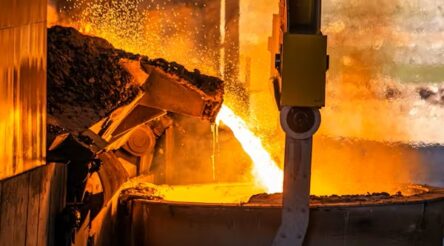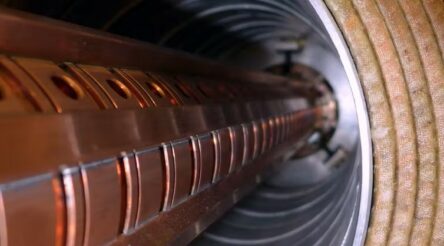Spotlight on scaleups: built to scale
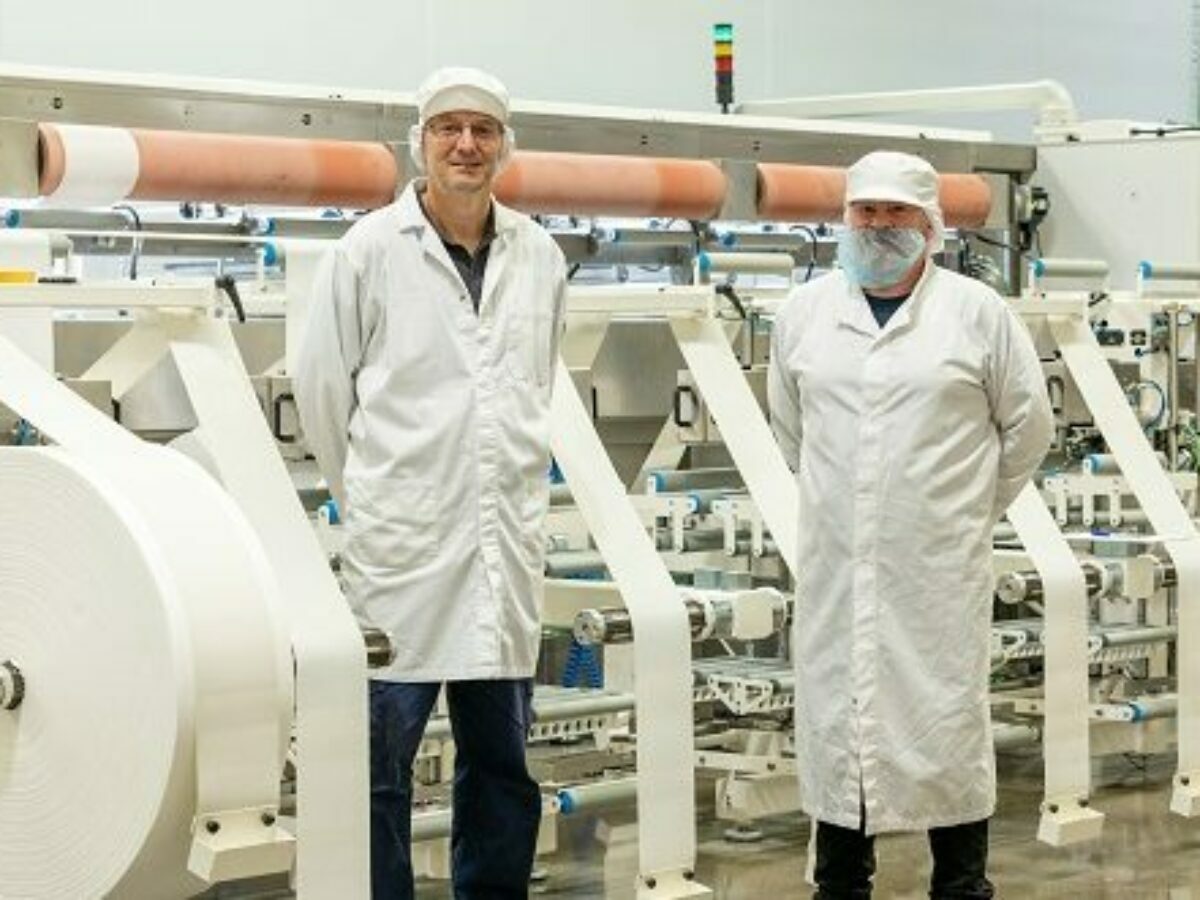
On Monday we published part one of this article, concerning what a scaleup company is and why they matter. Today we conclude by looking at what they need. By Brent Balinski.
There are 25,000 tonnes of wet wipes thrown out by Australians every year, all made of polyester or polypropylene and therefore non-biodegradable, and almost entirely imported, according to Phil Scardigno’s market research.
The Hygiene Co., the company Scardigno co-founded, has been in fully-automated production for only half a year and is focussed on a solution to a clear problem.
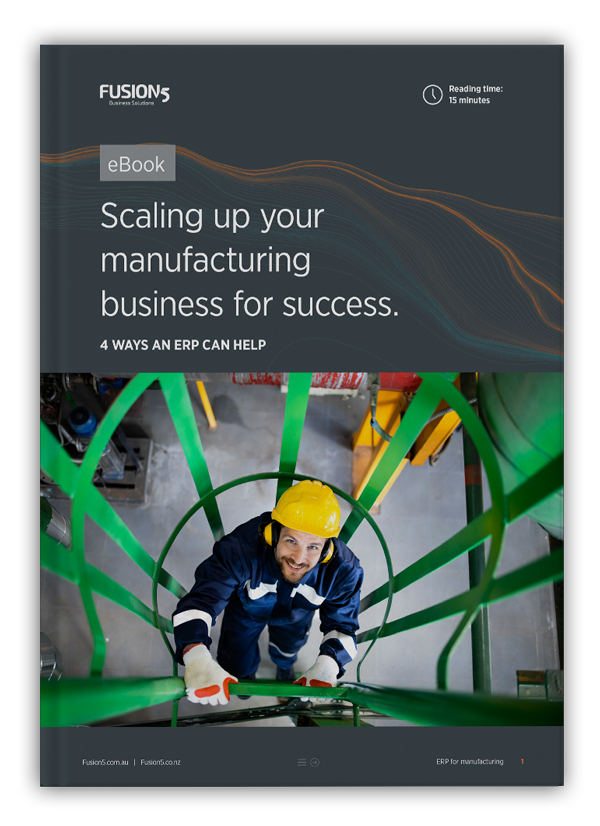
This series is sponsored by Fusion5. Download Fusion5’s free eBook — Scale up your manufacturing business for success. 4 roadblocks to growth — at this link.
The 27-employee business is Australia’s lone maker of a plastic-free alternative – currently sold through Chemist Warehouse, Foodland, and some OEM and hospital tender deals – and has been bootstrapped by Scardigno and business partner Corey White. It recently earned a place on this title's Australia's 50 most innovative manufacturers list, published last month.
There are no plans to seek investors to expand at this point, but Scardigno is pretty clear on what you’d need to win them over.
“If we were in a situation where you had to go and raise capital, I think the key is to have something that's innovative and unique,” he tells @AuManufacturing.
“Particularly for Australian manufacturing; you’re not going to compete on commodities and trying to out-cheap the Chinese… You need to have that point of difference. And for us the sustainability part is the big part.”
Venture capital backing has improved vastly over the last decade, but few startup manufacturers would say raising is easy.
Plant-based ingredient company Harvest B was founded in 2020 and managed a $3.5 million seed round in 2021.
Asked about what they have done right in attracting backers so far, co-founder and CEO Kristi Riordan is quick to preface an answer with, “It's hard in manufacturing, it's hard in Australia and it's hard in the current climate. I don't think anybody should go around suggesting otherwise.”
Venture investors are far less familiar with manufacturing than they are with software. But in the early days, you’d probably have to look to local venture capital, with banks and private equity unlikely to be supportive.
“As you get going, you have more choices in where you get access to capital. You can get access outside of Australia, where you've got more diversity in investors,” Riordan tells @AuManufacturing.
“You've got, I would say, more risk-tolerant investors as well. Very different opportunities, once you get a base of activity. I can imagine our next round of funding will include… capital that is outside of Australia.”
Besides understanding a capital strategy, it also helps if you can tell the company’s story and have a team assembled that could credibly deliver against it.
“That’s an investible company”
Gilmour Space Technologies is currently in the middle of an investor round, co-founder and CEO Adam Gilmour tells us when we speak in mid-July.
The company, which aims to launch an orbital rocket by the end of the year, raised $5 million in a 2017 Series A round, $19 million the following year in a Series B, and $61 million in a 2021 Series C.
Gilmour says that VCs are not very interested in companies promising incremental growth, and that manufacturers need to pick a market with significant demand and be making high-value products if they want to impress them.
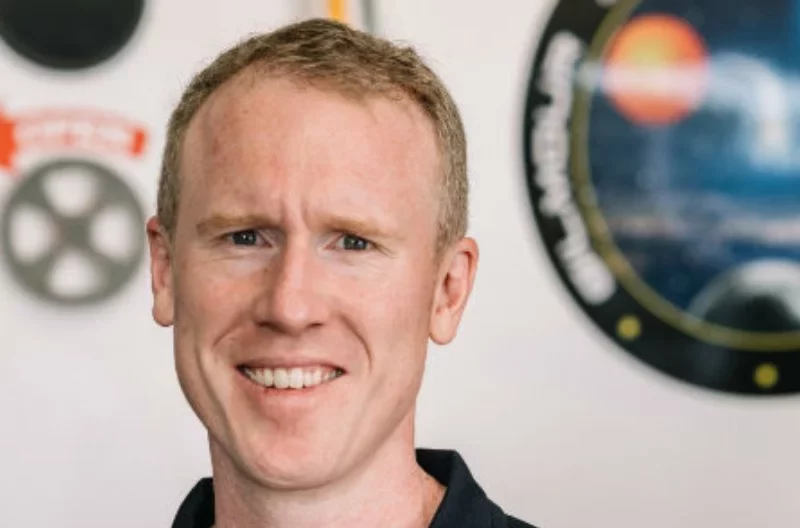
Adam Gilmour (credit Gilmour Space Technologies)
“If you go to an investor and you say, ‘I'm going to make $20 million next year and $23 million a year after and in ten years I’ll make $40 million,’ they don't really care,” explains Gilmour.
“But if you say, ‘I'll make $20 million this year and in three years I'll make $200 million, and then in ten years I’ll make $1,000,000,000, that's what they care about.
“So what does that mean in terms of a market? If you're selling something that's $1,000,000 a pop, and you sell a thousand of them, and they really do see a market for a thousand of them, or there's a market for 20,000 and you're going to be 5 per cent of the market: that's an investible company.”
What else is needed to grow companies with international relevance, besides a point of difference, a story to tell and a shot at a lucrative market?
The topic of an ecosystem is another answer.
Commercialisation of more IP developed locally is something Breakthrough Victoria would like to see, explains CEO Grant Dooley.
“There is no one single answer though, it’s about taking a collaborative and ecosystem-wide approach,” he tells @AuManufacturing.
“This includes better collaboration between not only business and research organisations but also between businesses themselves which will help manufacturers grow.
“We also need to manufacture with a global market in mind, utilising Industry 4.0 technologies to enable an increase in competitiveness through not only operational improvement but also a focus on the high-value parts of the manufacturing supply chain, such as R&D, design and service provision.”
Where government might have a role
Riordan also cites the importance of an ecosystem, with entrepreneurs, financiers, and focus from government on areas of national importance, for example around job creation, supply chain security, or environmental benefit.
“Some people say we need to kingpin people, right? We need to actually support, invest and engage in someone who can win,” she explains.
“And I think some of that is coming from government investment and saying ‘we're going to pick some industries where we're going to put our finger on the scale and say these are strategic to Australia and we are going to encourage them, help them to succeed.’
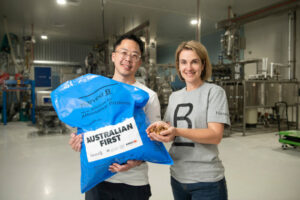
Harvest B co-founders Alfred Lo and Kristi Riordan (credit AMGC)
“You know, the National Reconstruction Fund offering access to scaleup capital, low interest rate loans – those are critically important.”
Scardigno believes that there’s an appetite from the public for Australian Made products, but not from government.
“If you had government departments buying Australian made, federal, state and local, then you're not spending those marketing dollars to compete to get your product into the hands of end users,” he says.
“I don't think there’s enough done in that procurement field. There's a lot of talk of it, but a lot of the time it’s rhetoric, I think.”
Companies sometimes make the case for governments to step up as a first customer of new technologies, with this validation something they can use in their pitches to potential overseas clients.
Gilmour offers that there’s an inferiority complex problem, not among startups but among governments, and some boldness is needed in giving promising new high-tech companies a go.
“There’s this chicken and egg thing where the government says, ‘Oh, I want to buy a new whatever. I want reliability and sustainability, and I can’t see that in Australia. So I buy it from overseas,’” he shares.
“And every time they make that decision, they're taking away the opportunity for an Australian company to step up and be that reliable supplier.”
Main picture: Scardigno and White (supplied)
 This series is sponsored by Fusion5. The decision to expand your manufacturing business is an exciting one, but it also comes with its fair share of challenges. So, what are they, and how can an ERP help you overcome them? Download Fusion5’s free eBook — Scale up your manufacturing business for success. 4 roadblocks to growth — at this link.
This series is sponsored by Fusion5. The decision to expand your manufacturing business is an exciting one, but it also comes with its fair share of challenges. So, what are they, and how can an ERP help you overcome them? Download Fusion5’s free eBook — Scale up your manufacturing business for success. 4 roadblocks to growth — at this link.
Further reading
Celebrating Australian sovereign capability: some thoughts on the importance of procurement
Wiping away a 25,000-tonne national problem
The importance of space technology in Australia
Celebrating Australian sovereign capability – 2023 is the year for liftoff
@aumanufacturing Sections
Analysis and Commentary Awards casino reviews Defence Gambling Manufacturing News Online Casino Podcast Technology Videos


